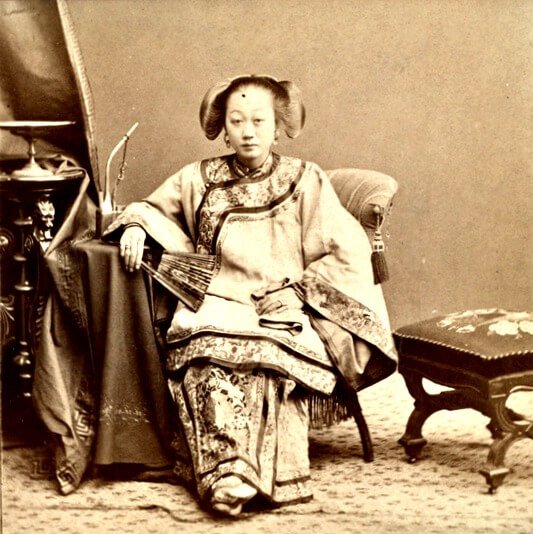"In the Clutches of the Chinese Tiger"
Image shows a kitten marked "Chinese cheap labor" growing up to be a tiger that kills everybody in its path.
1. In How Much of These Hills is Gold, Pam Zhang crafts a re-imagined American West, filled with magic and myth, at the height of the Gold Rush. The epigraph reads: "This land is not your land" but within Chapter One, Lucy recalls Ba’s words: "You remember you belong to this place as much as anybody." (24). What do you think the novel is saying about birthrights? Are they inherited or claimed?
2. Much is made about the burial process—for loved ones; for things and animals; for past selves. Is there a right way to honor the dead as seen in the novel? What does Sam’s decision to take the two silver dollars from Ba’s burial tell us about their relationship?
3. Ba and Sam are prone to fanciful storytelling. Consider the many stories told within the novel, as well as the tellers. What are the differences between the stories that the characters tell one another and the stories they tell themselves? To what extent is myth involved in the creation of each character’s origin story?
4. Bodies, like the land, are often claimed. At the end of Part Two, Sam is "born" as Ma "dies." Dissect the ways in which, Lucy, Sam, and Ma adhere to or subvert gender norms throughout the novel.
5. Compare and contrast the various teachers in the novel, their specific motivations, and their successes. Billy to Ba; Teacher Leigh to Lucy; Ba to Ma. etc.,—what kind of education does each receive? What are the power dynamics in evidence between teacher and student?
6. Ba helps Sam become the boy he always wanted to be, meanwhile Lucy and Ma are thick as thieves. Discuss the differing family dynamics. Why does Ba choose to tell Sam Ma’s secret, but not Lucy? Why doesn’t Ma seek out Lucy after she’s disappeared if they’re so close? In what ways do Sam and Lucy exemplify characteristics of each of their parents?
7. In Part Three, Ba speaks through the voice of the wind and hopes that Lucy hears it in the night. How does the revelation of Ba’s true origin affect your reading of him throughout the book? Did learning his side of the story change your perspective about his behavior and motivations?
8. The novel places a large significance on gold and Ba’s belief that prospecting is a talent. The other mountain folk, however, think striking gold has all to do with chance. In what ways does the novel interrogate these ideas? What other factors are at play in one’s ability to strike gold?
9. The environment is as much a character as Lucy and Sam’s family and is often anthropomorphize. Analyze the relationship between the characters and the natural world, as well as animals, both real and imagined. Why do you think the author chose to name the chapters after recurring natural elements?
10. When we encounter Lucy and Sam in Part Four, Lucy has chosen to settle in the town of Sweetwater, and Sam chooses life on the trail. Consider the dichotomy and tension between civilization and wilderness in the novel. Are there elements of each in the other?
11. Throughout the novel, Lucy often asks "What makes a home a home?" Does she ever find a sufficient answer to that question? Consider Ma’s homeland across the sea, the family’s home in town, Lucy’s place in Sweetwater. Are there degrees to what can make a "home"?
12. What do you think Lucy asks the gold man for at the conclusion of the novel? Why do you think the author chose not to name it?
(Questions issued by the publisher.)
Author Interviews:
hills-is-goldhttps://
Tiger image credit:Asian Americans: Gold Rush Era to 1890s curated by University of California staff, available under a CC BY 4.0 license. © 2005, Regents of the University of California.



Comments
Post a Comment